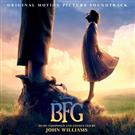|
|
||||
|
by Richard Jack Smith  Below are more soundtrack reviews of recent and archival releases. The BFG (John Williams, 2016) **** My initial impressions regarding The BFG by John Williams were not positive. Read the following statement. Pretty but insignificant, John Williams’ The BFG contains neither the charm nor the durability of Star Wars, Indiana Jones, Jurassic Park or Superman. Dust off the cobwebs because scores such as Hook, Harry Potter and The Adventures of Tintin also gain reverential treatment. While I respect Williams for his grace and open heart, it’s impossible for me to endorse the blatant unoriginality behind this effort. Ghostbusters (Theodore Shapiro, 2016) **** Theodore Shapiro’s exciting score for the Ghostbusters reboot dazzles through apocalyptic wonder. Check out the density in those choirs. It’s spine-tingling! Like Joe Kraemer who energised Mission: Impossible – Rogue Nation, Shapiro summons a creative blend of horror, mystery and action. High points include “Subway Ghost Attack” and “The Power of Patty Compels You.” While it’s easy to imagine Christopher Young or Danny Elfman having fun here, the strength in Shapiro’s writing emerges unexpectedly. His score for Ghostbusters seems relatively short, yet there are countless hours of pleasure for the taking. Macbeth (Jacques Ibert, 1948) *** Darkness reigns throughout Jacques Ibert’s Macbeth. Frankly, there’s no need to view Orson Welles’ film to gain a sense of how Ibert’s accompaniment would work. There’s horror to spare, and if any writer could convey musicality through verse it was William Shakespeare. For instance, the horn playing for “Macbeth after the Murder” seems cheeky, almost a Mickey Mouse effect. Just to clarify, that’s a good thing. Thus, Ibert extracts every sweat drop and blood-stained fibre from this masterful play. Mysterious Island (Bernard Herrmann, 1961) * Regardless of composer or filmic narrative, the first question to arise must be: does the music convey an emotional life? So, it troubles this critic to say I was unmoved by Bernard Herrmann’s Mysterious Island. It’s a big score, fully orchestral. Between “Prelude” and “Finale,” there are sixty one cues. Imagining the Herrmann fan base to be significant, most will take little notice of what I write here. After all, musical tastes end up subjective despite what naysayers or champions might believe. Frankly, I wanted to love Mysterious Island. Yet this never-ending collage of sound bites rarely whistled ‘boo’ in my ears. A pity really. Racing Stripes (Mark Isham, 2005) This… is an outrage. Mark Isham’s Racing Stripes almost made me dig out the composer’s similarly schmaltzy Dolphin Tale. Both scores prove cornier than corn, adding all the clanging bells for safe, predictable Americana. Allow me to step away for a moment and state that there are several terrific examples on this frontier, including The Natural. However, Racing Stripes doesn’t take a bold enough turn. Return to Oz (David Shire, 1985) ** An emotionally troubling score, David Shire’s Return to Oz proves slippery at best. It was impossible for me to settle into an emotional groove, especially during Shire’s evasive 11-minute “One Guess Left/But Not for Much Longer/Stop/Nome Chase/Final Chaos and Restoration/Triumphal March.” By comparison, I’d cite Alex North’s Dragonslayer as a greater example of aleatoric expressionism. The Similars (Edy Lan, 2015) **** Right away, clearly defined themes make Edy Lan’s The Similars a unique addition to thriller scoring. Admittedly, “Bandages, Threat and Convulsion” does contain a reference to Bernard Herrmann’s Psycho, notably the shower scene. However, Lan doesn’t wrap himself in homage because he stays in sync with his own narrative. Above all, “Transformation!” carries all the requirements for an essential purchase. Them! (Bronislau Kaper, 1954) **** Composer Bronislau Kaper doesn’t waste a single note during the “Main Title” for Them! Movies about giant killer ants require exceptional music, and Kaper delivers a la mode. Crucially, he defines this scenario using musical fireworks of tremendous variety. Above all, record label Monstrous Movie Music has captured the haunting quality behind his music. As such, this re-recording uncovers a level of detail that’s unprecedented. Personally, I found “Ant Hole/Burning the Ant Hole” to be the most exciting cue. However, “The Descent/Ant Chamber” holds extra surprises. Torn Curtain (Bernard Herrmann, 1966) **** Bernard Herrmann’s thunderous treatment for Torn Curtain didn’t suit frequent collaborator Alfred Hitchcock. So the score was dropped in favour of a jazzier alternative, and composer John Addison got the job. This would be the last time Hitchcock and Herrmann would work together. Previously, they made history with Vertigo, North by Norwest and Psycho among others. While it’s debatable that any music could elevate Torn Curtain, the soundtrack offers a fun solo experience. Hitting home in a big way, “Prelude” establishes a heavy Cold War vibe. In terms of atmosphere and coordination, parallels can be made with Herrmann’s Citizen Kane. For me, the most riveting cue in Torn Curtain would be “The Killing,” a striking effort that embraces similar madness to Vertigo. Overall, Torn Curtain could be the greatest unused score for a Hitchcock movie. SCORE OF THE MOMENT The Alamo (Dimitri Tiomkin, 1960) ***** Dimitri Tiomkin’s The Alamo holds something unique in a film score: durability. At first, my curiosity burned so brightly I needed to buy this soundtrack forthwith. While not every release in my collection has held up under scrutiny, Tiomkin’s effort bears no such stain. Also, I marvel at the detail wrought by this Oscar-winning composer. For the re-recording, I acknowledge producer James Fitzpatrick, conductor Nic Raine and the City of Prague Philharmonic Orchestra. Their collective passion has generated a new lease on life for older film scores. Major highlight: “The Charge/Lancer’s Charge/Travis’ Death/North Wall/Death of Crockett and Bowie.” This belongs with the greatest music of Max Steiner, Erich Wolfgang Korngold, John Williams and Terry Plumeri. |
||
|
© 2024 - ReelTalk Movie Reviews Website designed by Dot Pitch Studios, LLC |



